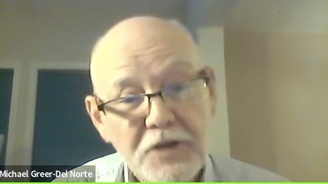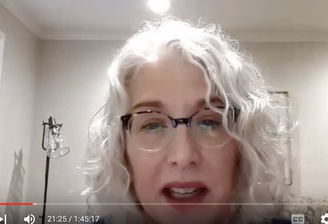Jessica Cejnar Andrews / Wednesday, Oct. 12, 2022 @ 4:22 p.m. / Education, Elections
DNUSD School Board Contenders Opine on Infrastructure, Food Security, School Climate at Forum

Michael Greer
Candidates for both open seats on the Del Norte County Unified School District Board of Trustees drew on their personal and professional experiences to try to convince voters that they’d be an asset to the position.
True North Organizing Network’s candidate forum Tuesday featured Trustee Area 2 contenders William Meriwether and Abbie Crist and their counterparts running for the Trustee Area 5 seat, Michael Greer and Phillip Williams.

Phillip Williams
Candidates fielded questions about school infrastructure, food security and school climate. COVID-19 figured heavily in these topics with one True North participant, Susan Andrews, a DNUSD psychologist, pointing out that the pandemic has significantly impacted school climate.
“Since COVID, the additional individual shared trauma that families have experienced has led to even worse school climate across multiple sites,” she said, “increased violence, harassment and bullying and vaping to cope with anxiety.”
School infrastructure

Abbie Crist
Mother of three, Angela Stanley, pointed out that DNUSD campuses are in various states of disrepair. While a bond is necessary for DNUSD to make much-needed upgrades to its schools, the last time the community approved a bond measure was in 2008, she said.
Stanley’s question — “What would you do as a school board member to address the poor infrastructure of our schools?” — came after the DNUSD Board in February decided against placing a new facilities bond measure on the Nov. 8 ballot.

Will Meriwether
DNUSD’s director of facilities, Steve Morgan, has said a successful bond measure could pay for eight modernization projects at roughly $47 million. However, DNUSD trustees have never indicated an actual target for a bond measure.
On Tuesday, Meriwether, a political science and history professor at College of the Redwoods’ Del Norte campus, said in addition to supporting a bond measure for infrastructure, the district should also reach out to the state and federal governments. He mentioned President Biden’s Build Back Better Plan, which was going to focus on infrastructure and said grant funding may be able to repair Del Norte schools.
Meriwether also addressed the “human infrastructure,” stating that DNUSD must retain the quality instructors it has and recruit new teachers. He also compared Del Norte County with Humboldt, saying that not taking advantage of state initiatives could leave Del Norte County behind.
“What we are going to see is a Humboldt County that grows economically and a Humboldt County that teaches their students how to engage and participate in a globalized world, provided by funding from the state with the initiatives at Cal Poly Humboldt,” Meriwether said. “If we do not engage in that and if we do not find a way to improve our standards here, then just 90 miles will separate us from a place in which the state is heavily investing.”
Crist, who grew up in Del Norte County but practiced law in Los Angeles, pointed out that local schools weren’t new when she was a kid. She, too, mentioned that obtaining more funding for infrastructure, but her priority, like Meriwether’s, is also the “human infrastructure.”
When she returned to Del Norte in 2019, Crist became a volunteer with the Court Appointed Special Advocates program of Del Norte County. As a CASA, she said she’s seen a lack of tutors and mentors to help with academic and emotional difficulties, particularly for youth navigating the foster care system.
“I think my priority would be putting people into the classrooms,” Crist said. “I just think that is so incredibly important and that is something I would really focus on as a first step.”
Phillip Williams, a Yurok Tribal Council member, who also grew up going to Del Norte County schools — he mentioned Margaret Keating Elementary School in Klamath — said before seeking to pass a bond measure, the school district should pursue grant funding.
With last year’s infrastructure bill, “there’s a lot of free money,” Williams said. The school district needs grant writers.
“With the Yurok Tribe, we went after a lot of that money and we got a lot of money from that infrastructure bill, so we know it’s out there,” Williams said. “What we’ve been looking into doing is hiring consultants to go after that money. It’s worth it to invest some money to hire consultants to go after those grant opportunities. It’s going to pay us in the long run.”
Greer is a retired special education teacher who moved to Del Norte County from Paradise, Calif. where he was a member of the school board for 14 years. Before the Camp Fire in 2018, Greer said the school board in Paradise spearheaded a way to replace its portables. After two years of substitute teaching at Del Norte schools, Greer said he can attest to the infrastructure concerns.
But, he said, “education is politics.”
“In order to help with infrastructure, there are people you can talk to to get on a list to go ahead and refurbish, redo, rebuild the district because it needs it,” Greer said. “I’ve been at the different schools…. Only through being able to address those issues through political means, financial means, and grant means, because as Phillip said, the money is there, but you have to know how to go about and get that.”
Food security
Chrystal Helton, also a mother of three, celebrated the return of salad bars at Del Norte county schools — a drastic shift from what students ate last year, she said. However, though access to fresh veggies has improved, Helton said her second-grader refused to eat his lunch because it was another “mystery meat barbecue pork sandwich.”
Many parents and students feel the same, Helton said.
“Either the food is too processed, it’s gross (or) it’s moldy,” she said. “This leads to things like food waste as well as students continuing to go hungry because they don’t want to eat what is provided. We have a high percentage of families who are food insecure and rely on eating school food.”
Helton asked each candidate what they would do to improve the food at DNUSD.
Both Greer and Williams, who seeks to represent Trustee Area 5, which includes Klamath and Margaret Keating Elementary School, said the offerings at the county’s outlying schools are of poorer quality than its in-town campuses.
Greer said he thinks the outlying schools like Margaret Keating, Gasquet Mountain School and Smith River School should be able to prepare most of their food on site. Doing this, he said, will ensure the food is more nutritious.
As a school board member in Paradise, Greer said he visited cafeterias regularly and ate the food.
“I had a great working relationship with the cafeteria,” he said.
Williams said when his children were at Margaret Keating in 2000, the California Conservation Corps would prepare food for the students. However it wasn’t sustainable, the money wasn’t there to keep that program going and it failed, he said.
Like Greer, Williams said schools in Crescent City have access to fresher food than the outlying schools. But Margaret Keating lacks the infrastructure to prepare food on site because everything’s outdated, he said.
“I went to school there in the ‘80s and we could barely do it then,” Williams said, tying his response back into the earlier discussion regarding school infrastructure. “If we get new infrastructure to put in a new kitchen and humans, get people to fill positions, then we can start preparing food onsite.”
Crist pointed out that Del Norte Unified has a huge percentage of kids — 71 percent — on free or reduced meals. But the complaints about processed food is an issue that stems from the COVID-19 pandemic when DNUSD staff were unable to prepare hot food, she said.
“Everything was processed food,” said Crist, who added that a friend works at Crescent Elk Middle School’s kitchen, which supplies the food for the district’s elementary schools. “They have salad bars in almost all schools again, they’re using fresh produce again and making a concerted effort to make things better.”
If she was elected, Crist said she would determine if the complaints about the food stem from a personnel issue or if it’s the decisions being made about the food itself.
Meriwether agreed with Crist that the complaints bout the food stem from COVID. Pointing out that all Del Norte County students can eat free — referring to the federal Community Eligibility Program that DNUSD qualified for in 2019 — Meriwether said if students aren’t eating the food, they’re still going hungry.
“For far too many of our students, it’s the food they get in school which is going to help nourish them for longer than it needs to,” he said. “Part of this is personnel. Getting more individuals to be able to help with food preparation. It’s great some of the salad bars are coming back in, but we do have to make sure there are healthier options for kids and we’re teaching kids healthier eating habits at an early age to help set them up success in the future.”
School climate
Though she touched on COVID-19, Andrews pointed out that families have talked about improving school climate for years and there is a lot of work to do locally.
DNUSD has restorative programs, such as Positive Behavior Interventions and Supports and Multi-tiered Systems of Support to address social and emotional challenges, according to Andrews. But many families either don’t understand those frameworks or don’t see concrete results, she said.
“They have expressed a desire, though, to see widespread implementation of diverse restorative practices that are more concrete, understandable and culturally informed,” Andrews said. “As a school board member, how might you approach supporting an effort to shift culture and mindset around restorative practices to improve school climate?”
Meriwether pointed out that the pandemic shifted a student’s ability to learn and to engage with others. In addition to addressing students’ base necessities, such as access to good quality food, he said the community needs to promote the idea that education is beneficial for human development, not just to obtain a job.
Meriwether also noted that Del Norte County is already diverse and is going to get more diverse as climate change refugees relocate to the area.
“We cannot as humans build lifelong relationships and quality relationships if we do not understand ourselves or our ability to communicate with each other,” Meriwether said. “And that is a fundamental aspect that needs to be incorporated at all levels within our school system.”
Crist, whose parents taught in school and who has a sister that still teaches, said sometimes those teachers are the most reliable adult a student has. It’s important a child has clear boundaries and know what the consequences are if they “hit that boundary.”
Crist said it was good to hear from one of the school psychiatrists and said the district should provide more support for its students.
“I know the district has certain disciplinary, for lack of a better word, protocols in place, but I don’t think it’s being implemented in any kind of a consistent manner. Everybody’s doing their own thing,” she said.
As a Yurok Tribal Council member, Williams said, the tribe focuses on restorative justice. There is curriculum available through exercises and games that show the value of restorative justice. One game he said his people practices teaches the value of “if you offend someone how to make it right.”
Del Norte County is diverse with thriving Hmong and Hispanic communities, in addition to tribal communities, Williams said. It’s also important that parents get involved so they can understand what restorative justice is, he said.
“Children are sponges,” Williams said. “They are learning from adults around them, and so if we’re going to inform the children, the parents need to know how to implement this at home.”
Greer said he’s practiced PBIS and MTSS in the classroom as a special day teacher and a resource teacher. He agreed with Williams that parents should be involved and there has to be a specific process that’s standardized throughout the district.
“The other thing, we don’t hold students responsible anymore and we don’t hold parents responsible,” he said. “They need to understand they have a responsibility for what they do and be able to acknowledge that maybe they made a mistake and have them go about repairing that. There are programs in classes right now that teachers use continuously to help with that.”
CLICK TO MANAGE